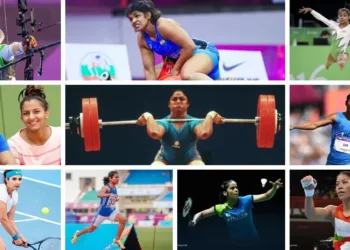The man who revolutionized Indian cricket with the Indian Premier League (IPL) has delivered a sobering verdict on football’s future in India. In a candid and wide-ranging conversation with RevSportz at his London mansion, Lalit Modi – the architect behind cricket’s most successful league – declared that “I think football is not going to happen in India,” citing deep-rooted systemic failures that have plagued the sport for decades.
This comprehensive analysis draws from the exclusive interview conducted by RevSportz, preserving Modi’s authentic voice and insights about Indian football’s challenges and his unrealized vision for the sport.
Table of Contents
The Visionary Who Almost Changed Indian Football Forever
When asked about his ambitions for Indian football, Modi’s response was immediate and passionate: “Yes, I did” want to create something revolutionary in Indian football. Long before the IPL became a global phenomenon, Modi harbored ambitious dreams that extended far beyond cricket.

Reflecting on his early days with ESPN, Modi explained his philosophy: “When I had a sports channel called ESPN, what was my job? My job was to create content and to get the best content. When we look at our country, the easiest thing to do is kick a ball around, and it’s the cheapest sport to play. All you have to do is not even have shoes; you just need a ball. That’s all you need.“
This accessibility fascinated Modi, who saw football’s potential in a cricket-obsessed nation. Yet despite this simplicity, he remains baffled by India’s failure to produce world-class talent: “I’m sure in a country like ours, we must have great talent, but nobody’s able to nurture them and find them. I cannot believe that today, sitting here in 2025, we don’t have good football players.“
The IPL Success Story vs. Football’s Unique Challenges
Modi’s confidence in creating compelling domestic content stemmed from his revolutionary approach with the IPL. He recalled the initial skepticism: “IPL was not international. IPL was homegrown. You know, like when the media first wrote about IPL, I remember everybody wrote about it—they are the only ones who didn’t believe in it. Everybody asked, ‘Who is going to watch this? They don’t watch Ranji Trophy.’ This is not even a Ranji Trophy match. ‘Here, Lalit Modi is going out there and creating something that nobody will want to watch.’“
The IPL proved doubters wrong, but Modi acknowledged that football presented fundamentally different challenges. When confronted with the reality that football clubs carry century-old legacies unlike cricket’s fresh start, Modi was candid: “That’s an inherent problem with that. With football worldwide, it’s a different model, and to change that model is impossible. It’s impossible.“
Learning from the ICL Disaster
Before the IPL’s triumph came a painful lesson with the Indian Cricket League (ICL). Modi revealed the backstory: “Again, ICL had too much money. It had too much money. It was a broadcaster that we couldn’t compete with. They took a half-baked idea of mine and tried to put it in there. I own the brand ICL. I let them continue with it.“
Tracing the ICL’s origins, he continued: “I own Indian Cricket League. It was a brand that I started too early when [Jagmohan] Dalmiya was the head of the board, and Raj Singh Dungarpur was running it. It was a 50-over format. I wanted to develop it.“
The Football Dream That Politics Destroyed
Modi’s sporting vision wasn’t limited to cricket. “I was also developing football. I was looking at all sports. It wasn’t just cricket. I had signed an agreement with the J-League [in Japan]. Priyaranjan Das Munshi was the head of football in those days. I wanted to launch a football league.“
But then came the familiar roadblock of Indian sports administration: “Then it got stuck again with politicians. Everybody wants a kickback. Everybody is saying, I will not allow you to do it.“
The frustration in Modi’s voice was evident as he described his thwarted ambitions: “We were going to do what I was going to do with cricket. I was going to do it with football. Again, there also, you needed international players. You don’t want retired staff. The problem is who was able to bring out the qualities of a player.“
The Global Context and India’s Heritage Dilemma
Modi’s analysis extends to understanding global football consumption patterns: “People, on the other hand, in countries only watch international stars.” This creates a challenging environment for domestic leagues without world-class talent.

Despite acknowledging India’s footballing heritage, particularly in regions like Bengal, Goa, and the Northeast, Modi sees fundamental flaws in the development approach: “Again, the heritage comes into play because India does have a heritage. But unfortunately, we have not been able to have players who are global enough. It’s a horse before the cart.“
The Root Causes: Infrastructure, Coaching, and System Failure
Modi identified the core problems plaguing Indian football development: “Again, it’s infrastructure-related, it’s coaching-related, and it’s unfortunate.” These aren’t merely technical issues but represent systemic failures that have persisted for decades.
His assessment is uncompromising: “But I think football is not going to happen in India. I think the next best thing you would find is probably Kabaddi.“
Key Factors Behind Football’s Struggles in India
| Challenge Area | Impact on Development | Modi’s Direct Assessment |
|---|---|---|
| Political Interference | Very High | “Everybody wants a kickback. Everybody is saying, I will not allow you to do it“ |
| Infrastructure | High | “It’s infrastructure-related… and it’s unfortunate“ |
| Coaching Quality | High | “It’s coaching-related… The problem is who was able to bring out the qualities of a player“ |
| Structural Model | Very High | “With football worldwide, it’s a different model, and to change that model is impossible“ |
| Talent Development | High | “Nobody’s able to nurture them and find them“ |
| Global Competition | Medium | “People… only watch international stars“ |
The Broader Implications for Indian Sports
Modi’s football failure represents more than one man’s thwarted ambition—it reveals systemic issues plaguing Indian sports development. His experience shows how political interference, inadequate infrastructure, and poor coaching combine to waste the country’s vast sporting potential.

The contrast with cricket is particularly telling. The IPL succeeded because it could start fresh, create new franchises, and establish its own ecosystem. Football’s established global structure, with century-old clubs and traditional hierarchies, makes such revolutionary change “impossible,” as Modi bluntly stated.
Why Kabaddi Offers Hope
Modi’s pivot to kabaddi as the “next best thing” isn’t random. Unlike football, kabaddi doesn’t compete with established global leagues or face complex international dynamics. The Pro Kabaddi League’s success validates Modi’s belief that Indians will embrace professionally presented indigenous sports.
Read More: Smriti Mandhana Becomes First Indian Woman Cricketer With Centuries in All Three Formats
FAQs
Why does Lalit Modi think football won’t succeed in India?
Modi believes football faces insurmountable challenges: “I think football is not going to happen in India” due to political interference (“Everybody wants a kickback“), infrastructure problems, poor coaching, and the impossibility of changing football’s established global model.
What was Lalit Modi’s original plan for Indian football?
Modi had concrete plans: “I was also developing football… I had signed an agreement with the J-League [in Japan]… I wanted to launch a football league” that would mirror his cricket success by combining international and domestic talent.
How did politics derail Modi’s football ambitions?
Political corruption destroyed his plans: “Then it got stuck again with politicians. Everybody wants a kickback. Everybody is saying, I will not allow you to do it” – the same issues that plague Indian sports administration today.
Can the IPL model work for football in India?
Modi says no: “With football worldwide, it’s a different model, and to change that model is impossible” because football has century-old club traditions that can’t be restructured like cricket’s fresh-start approach.
What does Modi see as the alternative to football in India?
Modi believes “the next best thing you would find is probably Kabaddi” because it doesn’t face football’s complex international dynamics and has already shown success with the Pro Kabaddi League format.








